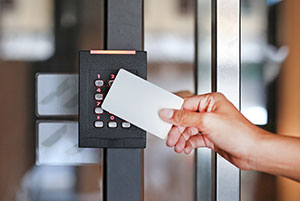In the bustling commercial districts where businesses thrive and communities converge, the significance of maintaining a safe and secure environment cannot be overstated. Here, every shopfront, office, and public space forms part of a vibrant tapestry that’s vital not just for economic prosperity but also for the well-being of the community. However, these areas, brimming with activity, often become targets for criminal activities ranging from petty thefts to more serious security threats.
This is where the concept of regular security patrols steps into the spotlight. Not merely a reactive measure to incidents, these patrols are a proactive strategy designed to deter crime before it occurs. They serve as vigilant eyes on the street, providing a sense of safety to business owners, employees, and customers alike. In this article, we explore how the presence of regular security patrols in commercial districts acts as a formidable force against criminal elements, thereby fostering a safer, more secure environment for all.
Understanding the Role of Security Patrols in Commercial Safety
In the realm of commercial district safety, security patrols play a pivotal role. These patrols, typically conducted by trained security personnel, are about responding to incidents and preventing them. Security patrols involve regular, systematic tours or inspections of a designated area. These can be done on foot, or by vehicle with a spotlight. The key element here is the frequency and unpredictability of these patrols, which are essential in maintaining a secure environment.
The significance of a visible security presence in commercial districts can’t be understated. It acts as a powerful deterrent to potential criminal activities. The sight of security personnel, equipped and alert, sends a clear message that the area is under watchful protection. This visibility is crucial because it raises the perceived risk for anyone contemplating a criminal act. The higher the risk of being caught, the lower the likelihood of a crime being attempted.
The Psychology Behind Crime Deterrence
The presence of security personnel in commercial districts plays a psychological game with potential offenders. It’s a well-documented fact in security studies that the perception of being watched or monitored can significantly alter behaviour. Criminals are less likely to target a location where they feel there’s a high chance of being caught. Regular security patrols amplify this perception, creating an environment where potential offenders feel there’s always an eye on them.
The role of regular patrols goes beyond physical surveillance; it’s about creating an atmosphere of vigilance. These patrols are not just about spotting and responding to crimes in progress; they’re about pre-emptively discouraging criminal elements from seeing the area as a viable target. This consistent presence of security teams, their interaction with the public, and their quick response to any suspicious activity collectively contribute to an environment where safety is paramount, and crime is perceived as too risky an endeavour.
The Impact of Security Patrols on Crime Rates
In Australia, commercial districts are increasingly turning to security patrols to deter crime and enhance public safety. This strategic approach has garnered attention for its effectiveness, as evidenced by various case studies and statistical data.
A notable example is the implementation of mobile patrol security services in Brisbane. These patrols, characterized by their visibility and unpredictability, have proven to be a significant deterrent to criminal activities. In Brisbane, there has been a noticeable improvement in public safety and reduction in incidents of crime following the introduction of these patrols.
The success of mobile patrols in Brisbane is partly attributed to their use of modern technology. The integration of GPS tracking and real-time monitoring has enhanced their operational efficiency, allowing for rapid response to security issues and greater coverage of commercial areas. Moreover, these patrols have been effective in fostering a sense of security among residents and business owners, reducing fear and anxiety associated with crime.
In other areas of Australia, similar trends have been observed. Regular security patrols have played a vital role in deterring crimes like petty theft, vandalism, and break-ins. The presence of patrol officers, both on foot and in vehicles, has been a reassuring sight for the community, contributing to a safer and more secure environment.
In summary, the implementation of security patrols in Australian commercial districts, as exemplified by Brisbane, has had a positive impact on crime rates. These patrols, supported by modern technology and community policing initiatives, offer a proactive approach to maintaining public safety and enhancing the quality of life in these areas.
How Security Patrols Contribute to a Safer Business Environment
The implementation of regular security patrols extends far beyond the direct reduction of crime rates; it significantly contributes to fostering a safer business environment. One of the key benefits of such patrols is the enhanced sense of security among customers and employees. When people feel safe, it positively affects their behaviour and decision-making. Customers are more likely to frequent businesses in areas they deem secure, and employees tend to be more productive and satisfied in a safe working environment.
This enhanced confidence in safety leads to indirect benefits for businesses. A secure environment is conducive to economic growth and stability. Businesses in areas with regular security patrols often report increased foot traffic and higher sales. Moreover, the perceived safety of an area can lead to higher property values, more investment opportunities, and an overall more vibrant commercial district.
Community and Business Collaboration for Enhanced Security
The effectiveness of security patrols is significantly amplified when there is a collaborative effort between the businesses and the security teams. This partnership ensures that the specific security needs of the area are met and that there is a unified approach to tackling issues.
The Business Districts model shows an example of this collaboration. In various cities, Business Districts have been established where businesses in a defined area pay an additional tax to fund improvements within the district’s boundaries. Part of these funds is often allocated to security measures, including regular patrols. This not only ensures a dedicated security presence but also fosters a sense of community ownership over the area’s safety and well-being.
Another successful initiative is the formation of local business watch groups, akin to neighbourhood watch programs. These groups work closely with security patrols, providing them with insights into the specific needs and challenges of the area. This collaboration leads to tailored security strategies that are more effective in addressing the unique concerns of the business community.
In both cases, the collaboration between businesses and security teams leads to a more cohesive and targeted approach to safety, enhancing the overall security of the commercial districts. This partnership not only deters crime but also strengthens the community fabric, creating an environment where businesses can prosper.
Implementing Effective Security Patrol Strategies
Effective security patrol strategies in commercial districts hinge on several key factors, each contributing to the overall safety and efficiency of the operation. Here’s a breakdown of the crucial components:
- Integration of Technology:
-
- Use of CCTV cameras for surveillance.
- GPS tracking for monitoring patrol routes.
- Mobile reporting tools for efficient communication.
- Advanced software for predictive policing, utilising data analytics.
- Route and Timing of Patrols:
-
- Coverage of all critical areas within the commercial district.
- Unpredictable timing to deter potential criminal planning.
- Professional Training for Security Personnel:
-
- Comprehensive understanding of legal regulations.
- Skills in effective communication and emergency response.
- Training in threat detection and conflict resolution.
- Essential Skills for Patrol Officers:
-
- High level of observance to identify potential security threats.
- Approachable demeanour with strong communication skills.
- Proficiency in operating modern security technologies and tools.
By focusing on these elements, a security patrol strategy can effectively deter crime and maintain a safe environment in commercial areas.
Training and Skills: The Backbone of Effective Patrols
The success of security patrols greatly depends on the training and capabilities of the officers. Key aspects include:
- Comprehensive Professional Training:
-
- Ensures officers are well-versed in their duties and responsibilities.
- Includes a focus on legal knowledge, communication, and emergency protocols.
- Skills for Commercial Patrol Settings:
-
- Observational skills to detect unusual activities.
- Effective communication for public interactions.
- Proficiency in using security technologies and data analytics for crime prediction.
Investing in these areas ensures that patrol officers are not only present but also effective and efficient in their role of safeguarding commercial districts.
Overcoming Challenges in Security Patrol Operations
Security patrol operations, while crucial in maintaining safety in commercial districts, are not without their challenges. Addressing these challenges effectively is key to ensuring the patrols are both efficient and beneficial to the community. Here are some common challenges and strategies to overcome them:- Adapting to Diverse Environments: Commercial districts vary greatly in layout, population, and activity levels. Patrol strategies must be adaptable to these varying conditions.
- Resource Allocation: Effective deployment of limited resources, including personnel and technology, to cover the entire area adequately.
- Staying Ahead of Criminal Tactics: Criminals continually evolve their methods. Patrols need to stay informed and adapt their strategies accordingly.
- Ensuring Officer Safety: Keeping patrol officers safe is paramount, as they often work in potentially hazardous situations.
- 5. Data Privacy and Legal Compliance: When using surveillance technology, it’s crucial to comply with privacy laws and regulations.
- Tailored Patrol Strategies: Develop specific patrol plans for different areas based on their unique characteristics and needs.
- Efficient Resource Management: Use technology and data analysis to optimise resource deployment.
- Continuous Training: Regularly update training programs to keep officers informed about the latest criminal tactics and safety protocols.
- Legal and Ethical Training: Ensure officers are well-versed in privacy laws and ethical considerations, especially when handling surveillance data.
Balancing Vigilance with Community Relations
A critical aspect of successful security patrols is the ability to balance effective surveillance with positive community engagement. Here’s how this balance can be achieved:- Community-Oriented Policing: Officers should adopt a community-oriented approach, where they interact with residents and business owners, building trust and understanding.
- Regular Communication with Local Businesses: Establishing open lines of communication with local businesses helps in understanding their specific concerns and needs.
- Engagement Activities: Participating in community events or hosting public safety workshops can strengthen relationships with residents.
- Feedback Mechanisms: Implementing systems for community feedback on patrol operations to ensure transparency and accountability.
- Cultural Sensitivity Training: Providing officers with training in cultural sensitivity to ensure respectful interactions with diverse community members.
Future Trends in Security Patrols and Crime Prevention
The landscape of security patrols and crime prevention in commercial districts is continually evolving, driven by technological advancements and changing societal needs. Here’s a glimpse into the emerging trends and what the future may hold for commercial district security:
- Increased Use of AI and Machine Learning: Artificial intelligence (AI) and machine learning are set to play a bigger role in predicting crime patterns and optimising patrol routes.
- Advanced Surveillance Technology: The integration of more sophisticated surveillance technologies, including facial recognition and anomaly detection systems.
- Drone Surveillance: Drones could be increasingly used for aerial surveillance, providing a broader view and real-time data.
- Integration of IoT in Security Systems: The Internet of Things (IoT) will enable a more interconnected security network, where various devices can communicate and trigger alerts.
- Cybersecurity for Physical Security Systems: As reliance on digital technologies increases, cybersecurity will become an integral part of physical security strategies.
- Community-based Mobile Apps: Development of mobile applications that allow community members to report suspicious activities and receive alerts.
- Sustainability in Security Operations: A shift towards more sustainable practices in security operations, including energy-efficient technologies and reduced carbon footprint methods.
Predictions for the future of commercial district security suggest a blend of high-tech solutions and community engagement, with an emphasis on ethical and sustainable practices.
Legal and Ethical Considerations in Security Patrols
As security patrols evolve, it’s essential to understand and adhere to the legal and ethical frameworks governing these operations:
- Adherence to Privacy Laws: Security patrols must operate within the bounds of privacy laws, particularly when using surveillance technology.
- Ethical Use of AI and Data: The use of AI in security operations raises ethical concerns, particularly regarding data privacy and the potential for bias. Regular audits and ethical guidelines are necessary.
- Transparency in Surveillance Operations: Maintaining transparency with the public about surveillance methods and data usage is crucial in upholding trust.
- Community Consent and Engagement: Gaining community consent and input for surveillance and patrol operations ensures ethical practice and public support.
- Regular Legal Updates for Security Personnel: Security teams should be regularly updated on legal changes and trained to operate within these parameters.
- Balancing Security Needs with Individual Rights: Finding the right balance between ensuring security and respecting individual rights and freedoms is a continuous ethical challenge.
Staying informed and compliant with these legal and ethical considerations is crucial for the legitimacy and effectiveness of security patrols in commercial districts.
Key Takeaways
In summarising the key points covered in this blog, we underscore the critical role that security patrols play in maintaining the safety and security of commercial districts:
- Deterrence Through Visibility: The presence of security patrols acts as a significant deterrent to criminal activities, owing to their visibility and unpredictability.
- Psychological Impact on Crime: Regular patrols create a perception of surveillance, which psychologically discourages potential criminal behaviour.
- Reduction in Crime Rates: Melbourne and some areas in Australia have demonstrated that consistent security patrols lead to a measurable decrease in crime rates in commercial areas.
- Enhancing Business Environment: The presence of patrols boosts customer and employee confidence, indirectly benefiting businesses through a safer environment.
- Community Collaboration: Effective security strategies often involve collaboration between security teams, businesses, and the community, fostering a holistic approach to safety.
- Addressing Operational Challenges: Overcoming challenges in patrol operations requires adaptability, efficient resource allocation, and continuous training.
- Embracing Future Trends: The future of security patrols includes the adoption of advanced technologies like AI, drones, and IoT, enhancing efficiency and effectiveness.
- Legal and Ethical Compliance: Patrols must operate within legal and ethical boundaries, especially concerning privacy and data use.
Conclusion
For businesses operating in commercial districts, the implementation of regular security patrols should be a key consideration. These patrols not only contribute to deterring crime but also enhance the overall safety and attractiveness of the area.
The importance of security in commercial districts cannot be overstated. It’s not just about protecting assets; it’s about creating an environment where businesses can flourish, employees can work without fear, and customers can enjoy their experience. In an era where security challenges are ever-evolving, staying ahead with effective, ethical, and technologically advanced security measures is paramount. Therefore, we encourage businesses and community leaders to actively consider and invest in regular security patrols as a critical component of their safety and security strategies.
FAQ’s
What Role Do Security Patrols Play in Crime Prevention?
Security patrols are a critical component in preventing crime in commercial districts. By conducting regular, unpredictable tours of these areas, they provide vigilant surveillance, deter potential criminal activities, and create an environment where safety is a priority. Their presence increases the perceived risk for criminals, thereby lowering the likelihood of crime.
How Effective Are Security Patrols as a Deterrent to Crime?
Security patrols are highly effective as a deterrent to crime. Their visibility and unpredictability make them a formidable force against potential criminal activities. By maintaining a constant presence, they psychologically impact would-be offenders, making them think twice before committing a crime in the patrolled area.
What Deters Criminals Most in Commercial Areas?
A combination of high visibility of security measures, including patrols and cameras, along with the unpredictability of security actions, is the most effective deterrent for criminals. The presence of well-trained security personnel, equipped with the latest technology, sends a message that the area is well-protected and under constant surveillance.
How Do Regular Security Patrols Enhance Overall Safety in Commercial Districts?
Regular security patrols enhance safety by maintaining a visible presence that deters criminal activities, providing rapid response to incidents, and fostering a sense of security among business owners, employees, and customers. This enhanced sense of safety can lead to increased economic activity and an overall more vibrant community.
What Impact Do Security Patrols Have on the Perception of Safety Among Local Businesses and Residents?
Security patrols significantly enhance the perception of safety among both local businesses and residents. The consistent presence of patrol officers contributes to a feeling of security, encouraging more people to visit and engage with the commercial district. This increased sense of safety can boost business growth and community well-being.




